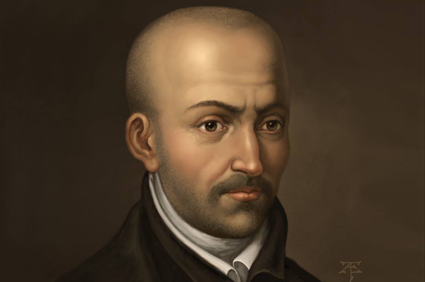Molinism (named after the 16th-century priest Luis De Molina) is, in my opinion, one of the best theological systems I have ever come across. It solves so many issues; primarily, it reconciles the meticulous providence of God taught in The Bible with a genuine human free will. But more than harmonizing God’s sovereignty and human free will, I have found that it even explains some soteriological conundrums, and would explain the inspiration of The Bible, and if evolution were true, it would explain how God guided it to produce the creatures He wanted.
Unfortunately, it is a minority view in the church, and I’ve found that most people have a poor and distorted view of what Molinism teaches. When Calvinists, Arminians (of the simple foreknowledge variety), Open Theists, or other non-Molinists describe Molinism and then proceed to criticize it, 9 out of 10 times, they’re bashing a straw man. They’re not arguing against anything Molinists believe. It’s frustrating to constantly have your views misrepresented.
In this blog post, I seek to correct several of the most common misrepresentations of Molinism that I have come across. Keep in mind that it is beyond the scope of this article to argue for Molinism’s truth (I’ve done that in other posts). This article is simply meant to explain what we Molinists believe, rather than why.
Misconception 1: “God looks into the future in order to learn what people will do.”
I’m not sure where this idea came from because it certainly doesn’t resemble anything I’ve ever read from the Molinist literature. No Molinist that I am aware would ever say that God looks into the future, observes people doing various things, and from observing us, acquires knowledge of what we will eventually do. For one thing, most Molinists I’ve come across (myself included) hold to a conceptualist view of foreknowledge, not a perceptualist view. What do these terms mean? A perceptualist view teaches that God literally sees the future, just like I see the words on the screen in front of me. God looks down the corridors of time and actually, literally sees what’s going to happen. A conceptualist view, by contrast, teaches that God does not literally see the future. The future doesn’t exist yet, and therefore God cannot see it. It is impossible for anyone to look at something that doesn’t exist. A Conceptualist view denies that God sees, the future, and instead asserts that God knows the future innately. He knows what’s going to happen ahead of time, even though he doesn’t see it in a visual sense.
I have sometimes said things like “God sees the future” or “The Lord sees all your tomorrows”, but I didn’t mean it in the same sense that a perceptualist would. I meant simply that He knows what the future is going to look like. God can see the future in His mind’s eye, so He knows what the things in the future will look like. Just like I know what Kevin Baldesare’s house looks like even though it’s almost been a year since I last saw it. I can “see” his living room, kitchen, extremely comfy sofas, etc. in my mind’s eye. I’m remembering the visual details. I’m “seeing” the past in my mind’s eye. I’ve always believed that God “saw” the future in a similar sense. He could have mind’s eye like details of what my grandchildren’s faces will look like, for example. But He doesn’t literally see them. They don’t exist yet to be seen in a literal visual sense.
In short: Conceptualism = God knows the future innately.
Perceptualism = God literally sees the future and knows it because He sees it.
This misconception of Molinism fails because it presupposes a view of foreknowledge that most Molinists reject.
Moreover, no Molinist believes that God ever “learns” anything. We believe God has always known everything there is to know. No one can teach Him. God has always known what could happen, would happen, and will happen. There isn’t a single true proposition that God doesn’t know and believe. We Molinists believe that God is omniscient and has been from eternity past. There has never been a time when God lacked any knowledge of any kind.
Misconception 2: “Molinism Makes God Dependent On Man’s Choices”
I encountered this one recently in a Facebook group. The person said “To say that God was dependent upon who He foresaw would accept Him to then elect them is false teaching. God is not dependent upon anyone or anything to do whatever He wants.”
But Molinists don’t believe this. Molinists don’t believe God is dependent on God for anything. Molinists don’t believe God is dependent on [creation, creatures, man] for anything.” God is not dependent on man’s choices for election either. We also affirm that God can do whatever He wants (Psalm 135:6), but we believe what He wanted was to create a world of free creatures, and ergo took their choices into account when deciding to actualize a possible world. Molinist don’t believe that God was forced to actualize a possible world in which humans possess libertarian free will. God didn’t have to create a world of free creatures if He didn’t want to. He could have actualized a world where He causally determines everything. Though we would argue that had He done that, our world would look a lot different than it does (since a good God would not cause people to commit sin). But since He wasn’t compelled to create a free will world, He, therefore, is not dependent upon free creatures for anything.
Sometimes this objection is raised with reference to William Lane Craig’s “Card Dealer” illustration. The analogy was used in an article Craig wrote responding to the question: “If God is good, why isn’t everyone saved?”. Essentially, God must face the truth of the CCFs (counterfactuals of creaturely freedom) that confront Him and choose which world to actualize within that framework i.e. “play with the hand He has been dealt”, because God cannot change the truth value of what a creature would freely do in a circumstance. James White and other Calvinists had a field day (and still do) attacking Craig on this point. The objection here is that God is dependent on human choices to a significant degree, and this undermines His sovereignty because He can’t just simply do whatever He wants because often times His creatures won’t get in line. The illustration appears to make God enslaved to the free choices of man. God cannot do some things simply because man won’t cooperate. Man appears to have some power over how God behaves.
The thing is, only if God wanted to actualize a world of free creatures does He have to play the cards He’s dealt. He could have chosen to be the card dealer if He wanted to be, but then, I would argue that we’d be living in a totally different world if that were the case. God would never deal evil cards. If God wanted a world of free creatures (and I think we have good grounds both biblically and philosophically for concluding that that is the kind of world God desired), then God would have to accept the fact that there are some possible worlds infeasible for Him to actualize simply because human beings’ free will wouldn’t go that way.
God only has control over the counterfactuals of creaturely choices in possible worlds where He causally determines everything. He has no control over counterfactuals of creaturely choices in possible worlds where said creatures have libertarian free will. In possible worlds where people have libertarian free will, God knows “If Bob were in circumstance C, He would freely choose action A over action B”, but God didn’t decide that this counterfactual statement would be true. Bob is the one who made this CCF (counterfactual of creaturely freedom) true. Likewise, counterfactual statements such as “If Suzan were in circumstance S, she would freely choose action B over action A” is a statement made true by Suzan, not God. Now, let’s say God wanted a world where humans are truly free, but He also wanted Bob to choose B in circumstance C, and He wanted Suzan to choose A instead of B when she found herself in circumstance S. God is stuck with a true dichotomy here. He would be unable to get Bob to choose B and Suzan to choose A in the above circumstances because that is not the direction in which their wills would go. God could perhaps get Bob to freely choose B if God were to place Bob in an entirely different circumstance (say, circumstance D), but it would be infeasible for God to get Bob to choose A in circumstance B. Sure, Bob would freely choose action A if placed in D, but He would not choose A if placed in C. God could actualize a slightly different world to get Bob to choose A, but it wouldn’t be any of the worlds where Bob finds himself in circumstance C.
When it comes to things like a world where no one does evil, but only does good all the time, or a world where everyone freely accepts Christ and is saved, it may not be feasible for God to actualize these worlds because of free will. God could only actualize a world where everyone does good or everyone is saved if He causally determined everything like a cosmic puppet master. If God actualizes a world of free creatures, then He does have to “deal the cards He’s dealt” and put up with the fact that not everyone would freely choose to obey Him or freely choose to accept Him.
I don’t think Molinism undermines the sovereignty of God or restricts His freedom because “He has to play the cards that He’s dealt”. God had the freedom to either be the card dealer or to play cards that were dealt with Him by His creatures. Based on biblical exegesis as well as philosophical arguments, I think the latter is the case.
As you can see, Molinism doesn’t make God “dependent” on human choices. We Molinists believe that God sovereignly chose to create a world of free creatures, and he took our choices into account when deciding which possible world of free creatures to actualize. But we believe that He was under no obligation to actualize a free will world.
Misconception 3: “Don’t you know Molina was a Jesuit? Molinism isn’t a Protestant doctrine”
Some non-Molinists have objected to Molinism on the basis that it originated with a Jesuit Priest. “Molinism is a view that every good Protestant should reject! It was formulated by a Jesuit Priest named Luis Molina! A JESUIT! Are you, as a Protestant, seriously going to embrace a view by a Catholic like him!?”
For some reason, people think that because the founder of Molinism (Luis De Molina) was a Roman Catholic, that therefore Molinism must be a Catholic doctrine. I seriously doubt that the people who make this particular objection have actually studied Molinism’s claims. If they did, they’d see that there’s nothing exclusively Catholic about it. And certainly, nothing about it contradicts any of the 5 solas [1]some would argue it violates sola scriptura, but that is dealt with in the next subheader.
Molinism is at the bare minimum; a view on free will and divine providence. Molinism teaches that human beings have libertarian free will and that God directs the world through His knowledge of what any free creature WOULD freely do in any given circumstance. This knowledge of what free creatures would freely choose in any given circumstance is called “Middle Knowledge”. It’s called “Middle” Knowledge because it is logically prior to God’s Natural Knowledge (What you could choose) and His Free Knowledge (what you will choose). By means of God’s Middle Knowledge, God can meticulously control history without having to causally determine our actions. For example, God knows “If Bob were in circumstance S, He would freely choose action A over action B”. If God wants Bob to choose action A but also wants Bob to be free in his decision, God can get Bob to choose A by creating a possible world in which Bob finds himself in circumstance S. As a result of being placed in circumstance S, Bob chooses A over B. God’s will is achieved and Bob’s freedom is preserved.
That’s about it. That’s “Mere Molinism”. As I said at the start of this article, Molinism can be applied to areas such as soteriology and evolution, but Molinism at its barest minimum, asserts that God not only knows what people could do and will do, but that God knows what everyone would do under any given circumstances, and that God uses His knowledge of what everyone would do to determine what will happen without violating peoples’ free will.
As you can see, there’s nothing particularly Catholic about it.
Moreover, if one rejects Molinism solely on the grounds that it originated with a Jesuit, one is guilty of the genetic fallacy. Whatever else Molina had wrong in his theology, it doesn’t mean that he got it wrong in Molinism. Molinism could have originated somewhere else, and it would be just as legitimate as if it originated with a Catholic. Molinism’s origin is irrelevant to whether or not it’s true. It is the genetic fallacy to attack the origin of the view rather than the view itself.
But the main issue here is the misconception that Molinism is a Catholic doctrine. It is not.
Misconception 4: “Molinism isn’t biblical. It’s just man-centered philosophy.”
Molinism is far too often construed as just a purely philosophical idea. Some will say “It’s just philosophy with no biblical basis”, or “It’s man’s philosophy imposed on The Bible” or something similar. However the objection is worded, the main point is that Molinism is philosophy, not doctrine exegeted from The Biblical text.
Now, I don’t want to spend too much time on this because I’ve already extensively written about it in my blog post “Is Molinism Eisegesis?”, but because this objection is so common, I think that it would be prudent to address it again here.
A big reason why so many people have this objection against Molinism is because they’re looking at it as though it were an exegeted doctrine, rather than a systematic theology. The former is a conclusion drawn straight from the biblical text. The latter is a system formulated to explain that which as been exegeted. I would never say “Molinism is taught in The Bible”. What I would say is “Molinism best explains the things that The Bible teaches”. The Bible doesn’t outright teach Molinism, but what The Bible does teach can be best explained by Molinism. What do I mean by that? I mean that non-Molinist systems tend to do a good job only explaining parts of scripture, but can’t account for the totality of scripture. For example, divine determinism can account for verses like Proverbs 21:1 which says “In the LORD’s hand the king’s heart is a stream of water that he channels toward all who please him.” and Proverbs 16:9 which says “In their hearts humans plan their course, but the LORD establishes their steps.”. However, divine determinism cannot account for 1 Corinthians 10:13 which says “No temptation has overtaken you except what is common to mankind. And God is faithful; he will not let you be tempted beyond what you can bear. But when you are tempted, he will also provide a way out so that you can endure it.” (this is perhaps the most blatant example of libertarian free will in the entire Bible). It also cannot account for Isaiah 30:1 which says “’What sorrow awaits my rebellious children,’ says the LORD. ‘You make plans that are contrary to mine. You make alliances not directed by my Spirit, thus piling up your sins.’” Divine determinism can account for the former, but not the latter. Simple Foreknowledge-Free Will can account for the latter, but not the former. Molinism can account for both sets of scriptures, however.
There are scriptures which state that God has a significant amount of control over what happens in the world (e.g Proverbs 21:1, Proverbs 16:9, Psalm 37:33), but there are also scripture texts that outright contradict divine determinism (Jeremiah 32:35, Isaiah 30:1, Galatians 5:7-8), and texts that assert or imply libertarian free will (e.g 1 Corinthians 10:13, Deuteronomy 30:15-19, Joshua 24:15). I haven’t found any view except for Molinism that can account for these two sets of seemingly contradictory Bible passages. I’m a Molinist because Molinism has the best explanatory scope of all the options I currently know of. All other views; Divine Determinism, Simple-Foreknowledge Arminianism, and Open Theism fail to account for the totality of scripture.
Molinism is a systematic theology. It is invoked to explain that which has been exegeted from Scripture. What has been exegeted from Scripture? That (1) God meticulously controls what happens in the world, and (2) humans have liberarian free will.
As I said at the start of this blog post, Molinism also can be applied to soteriology. Molinism isn’t a soteriological view in and of itself, but it can be applied to soteriology. I think Molinism helps explain the soteriological data of scripture much better than Calvinism or Arminianism. Just like the issue of free will and sovereignty, both the Calvinists’ and the Arminian’s view can explain only parts of scripture, but not the totality of scripture.
In his book “Salvation and Sovereignty”, Kenneth Kealthey explains in a summarized form why he is a Molinist. He writes:
“So why do I embrace Molinism? Because, like the Calvinist, I am convinced The Bible teaches that (1) God is sovereign and His control is meticulous; (2) man is incapable of contributing to his salvation or of even desiring to be saved; (3) God through Christ is Author, accomplisher, and completer of salvation (i.e., salvation is a work of grace from beginning to end); and (4) individual election is unconditional; and (5) the believer is secure in Christ. However, like the Arminian, I am also convinced The Bible teaches that (6) God is not the Author, Origin, or Cause of sin (and to say that He is, is not just hyper-Calvinism but blasphemy); (7) God genuinely desires the salvation of all humanity; (8) Christ genuinely died for all people; (9) God’s grace is resistible (this means that regeneration does not precede conversion); and (1) humans genuinely choose, are causal agents, and are responsible for the sin of rejecting Christ (this means that the alternative of accepting salvation was genuinely available to the unbeliever). As we will see, there is only one position that coherently holds to all ten affirmations, and that is Molinism.”
– Kenneth Keathley, “Salvation and Sovereignty: A Molinist Approach”, page 7, B&H Academic.
In science, one should go with the hypothesis that has the greatest explanatory scope of the data. I think the same should go for theology; the “mother of all sciences”. Molinism far exceeds Arminianism and Calvinism in explanatory scope in explaining the soteriological data. To dig deeper into the soteriological aspect of Molinism, click on this blog post. And be sure to read Kenneth Keathley’s book which I cited from above.
I became a Molinist because of its exhaustive explanatory scope in the area of (1) free will and divine sovereignty, and (2) Soteriology. I didn’t become a Molinist because I thought it was an interesting philosophy.
Now, you might object “But 1 Corinthians 10:13 doesn’t teach free will!” or “1 Timothy 2:4 doesn’t say God wants all people saved!” but that’s not really relevant to the issue I’m answering. We can debate whether there really is anything in need of reconciliation in The Bible, but the fact remains that I’ve adopted Molinism because I thought it provided a reconciliation.
Conclusion
These are some of the most common misconceptions of Molinism I keep coming across. I would hope that non-Molinists would stop misrepresenting the theology like they do, but they probably won’t.
References
| ↑1 | some would argue it violates sola scriptura, but that is dealt with in the next subheader |
|---|





